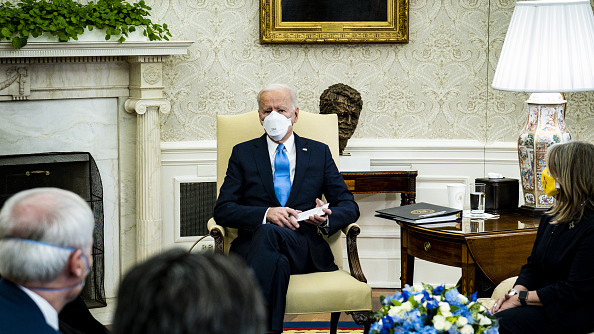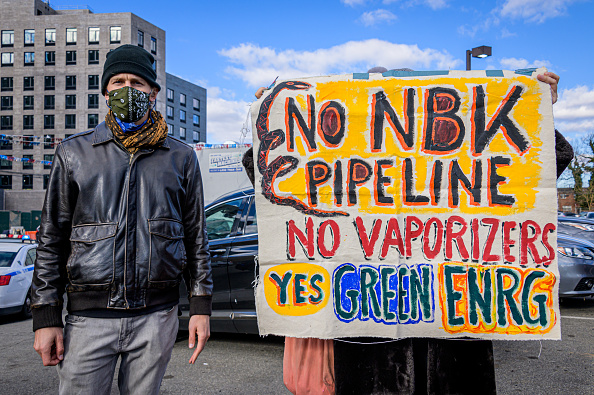
U.S. President Joe Biden meets with governors and mayors in the Oval Office of the White House in Washington, D.C., the U.S., February 12, 2021. /Getty
U.S. President Joe Biden meets with governors and mayors in the Oval Office of the White House in Washington, D.C., the U.S., February 12, 2021. /Getty
Editor's note: William Jones is the Washington Bureau Chief for the Executive Intelligence Review and a non-resident fellow of Chongyang Institute for Financial Studies, Renmin University of China. The article reflects the author's views and not necessarily those of CGTN.
After his two-hour phone call with Chinese President Xi Jinping, U.S. President Joe Biden met with a group of key senators with primary responsibility for the U.S. economy and urged on them the need to finance a major infrastructure for the United States.
Speaking of the rapid advance China has made in the development of infrastructure, Biden told the senators: "They're investing billions of dollars and dealing with a whole range of issues that relate to transportation, the environment and a whole range of other things. So we just have to step up." The president added that "I'm going to talk to these folks about, which is the key committee, is how we begin this. I've laid out what I think we should be doing."
Now this is not a new revelation. President Trump had also touted an infrastructure program during the 2016 campaign, and it was one of the measures that won him the overwhelming support of Americans. But his insistence that it be a primary initiative of private enterprise rather than government-financed kept the project in limbo. And given the fact that Congress was in no mood to compromise with Trump, negotiations for even a modicum of financing between Congress and the White House went nowhere.
Biden will face different problems in implementing such a program. He also has to finance this through congressional funding, and there will be the usual objections from Republicans, and probably some Democrats, who are more concerned with bringing down the whopping budget deficit than financing infrastructure.
A secondary problem will be the concerns of the proponents of the "Green New Deal," which has become the leitmotif of the Democratic Party. Now one can develop an effective "green" transport program — China by and large has done this. But if you are going to reduce the utilization of fossil fuels, you have to have a realistic alternative.

Environmentalist protesters are seen holding a banner disrupt the National Grids construction in Brooklyn, New York, the U.S., December 10, 2020. /Getty
Environmentalist protesters are seen holding a banner disrupt the National Grids construction in Brooklyn, New York, the U.S., December 10, 2020. /Getty
In accordance with the concept of "energy flux density," which was laid out many years ago by economist Lyndon LaRouche, but which now has gained a much broader understanding among policymakers, a growing economy has to move from energy sources which are less "energy-dense" to those that are more "energy-dense." Wind and solar energy are fine, but do not carry the same impact as, say, nuclear energy. How many acres of land do you need to build solar arrays to make up for one coal plant? Building these in a desert is not a bad idea, but relying on them for generating electricity in major cities bodes the danger of occasional "blackouts" when the sun simply doesn't shine.
China, on the other hand, doesn't have that problem. While they are building solar arrays and windmills, they are also investing heavily in nuclear energy – and they are working overtime to develop nuclear fusion. Biden probably doesn't have that option. The U.S. no longer build nuclear plants. The only major fusion research program in Princeton was largely put in mothballs. In fact, the United States is dismantling many of its nuclear plants, largely under the pressure of the "green movement."
The president could of course change course and begin building nuclear plants, but he would have to face big headwinds from his own party. The "green movement" in the United States has its roots in what was called the "zero-growth movement" in the 1970s, which was rabidly anti-nuclear. So the president will have to take on a major fight within his own ranks if he is to succeed with starting a nuclear program. But without viable alternatives for maintaining a high level of energy production while reducing reliance on coal, oil and gas, such a "green policy" will be more lethal to the U.S. economy.
It's probably a positive sign that Biden is looking at China's infrastructure program. If he avoids the foolish notion of trying to "take down" China's successful development strategy, which was the Achilles' heel for the Trump administration, he may learn some useful lessons. And the key lesson is that any dismantling of energy production for environmental reasons must be coupled with an equally or more effective energy source to replace it. If not, the price will be paid in a general reduction of energy throughput and a growing mortality rate for the American people.
(If you want to contribute and have specific expertise, please contact us at opinions@cgtn.com.)

